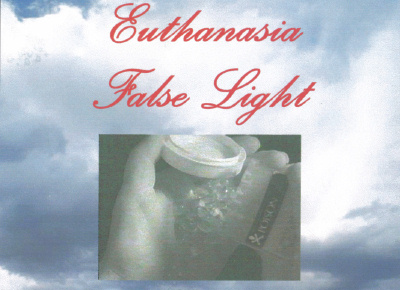April 13, 2005, 8:00 a.m.
Be Prepared
A person-to-person calling-the-shots plan.
By Rita L. Marker
Most people who have had personal experience dealing with health care for an incapacitated loved one have not run into unnecessary legal difficulties. That’s because, traditionally, health-care providers have turned to the next of kin for decision-making. If there is agreement between the decision-maker and the doctor, and if there are no objections from other family members, all goes smoothly. But, as we’ve all watched in Terri Schiavo’s tragic case, when there are disagreements, the results can be heart-wrenching
Over and over in the last few weeks, we’ve heard pronouncements from television’s talking heads that, in cases like Terri’s, when a person hasn’t left written directions about health care, all states have laws giving decision-making authority to the person’s spouse. Sounds logical. But it’s not quite accurate.
Forty states and the District of Columbia do, indeed, have laws specifying who can make decisions for a patient who does not have an advance directive. In many — but not all — of those states, a spouse is designated as first in priority, followed by adult children, parents, and siblings. Other states have different procedures for deciding who will speak for a patient.
For example, in Idaho, a parent, a spouse, and a guardian have equal status. Likewise, in Indiana, any of those listed (spouse, parent, adult child, sibling, etc.) can decide for the incapacitated patient. West Virginia gives the patient’s attending physician or an advanced nurse practitioner the right to select the decision-maker from the priority listing based on who the physician or nurse believes would be the best decision-maker. Thus, if the doctor doesn’t agree with the patient’s spouse about what should be done or not done, that physician can designate someone else (a parent, sibling, or close friend of the patient) as the decision-maker. And then there’s Connecticut where decision-making is left to the physician in consultation with the next of kin. Note that this means only that the next of kin must be consulted. It doesn’t mean that there be agreement. Essentially, the doctor calls the shots.
In California, a patient can orally designate someone to make his decisions when treatment begins. The designation lasts for the duration of the particular condition or stay in the health facility. That’s of little help, however, if the patient is not conscious when admitted for care.
Contrary to what has been said so often in recent weeks, Florida law does not give first priority to a spouse, but to a court-appointed guardian. A spouse is second to a guardian on Florida’s priority list. Although Michael Schiavo was Terri’s husband, his authority to remove Terri’s food and fluids came from his status as her court-appointed guardian. Very soon after Terri’s brain injury occurred, Michael petitioned the court to be named her guardian. Had one of her parents or siblings opposed Michael’s appointment at the time, or had any of them sought to become her guardian, it is possible that one of them may have become her decision maker. Whether a legal guardian is appointed and the determination of who that guardian is falls solely within the discretion of the court. Technically speaking, the court could even have appointed a guardian who was a complete stranger to make decisions for Terri.
A Directive you can live with
So what are people to do to make certain that their values are respected, their lives protected, and their medical care provided in a manner that they would choose?
Does this mean, as so many experts have advised, that everyone should have a living will? If, and only if, the term, “living will,” is being used generically to refer to an advance directive, the answer is “yes.” Frequently, lawyers and others who should know better call any advance directive a living will. But there are major differences between the types of advance directives. All living wills are advance directives, but all advance directives are not living wills.
A living will is the oldest type of advance directive. It is a signed, witnessed (or notarized) document, sometimes called a “declaration” or a “directive.” Most living wills instruct an attending physician to withhold or withdraw medical interventions from its signer if he is dying or in a permanently vegetative state. But, since the document is so vague and the attending physician may be unfamiliar with the signer’s views and values, the document could be interpreted by the physician in a manner that was not intended by the signer. A Washington State case provides a sad example of this.
Mary Jo Estep, a very active retired schoolteacher, broke her hip. As part of her rehabilitation she checked into a nursing home where, on admission, she signed a living will that stated she was not to receive extraordinary measures if she was dying. A few days before she was to go home, a tired nurse gave Ms. Estep the wrong medication — a mistake that could have been reversed easily at a local hospital emergency room. But that didn’t happen. Instead, a doctor wrongly interpreted her living will to mean that Estep would not want treatment. By evening, Estep was in severe distress, with her blood pressure falling and pulse weakening. She died that night. Legal experts in Washington later said that Estep’s case fell into the murky and untested realm of state law. Eventually the case was resolved when the nursing home was fined $2,500 for a medication error.
Mary Jo Estep’s case is unusual but not unique. Other cases of overly broad interpretations of living wills have taken place. Yet the problems with the living will should not deter people from having a different type of advance directive.
The most protective and the most flexible type of advance directive is the “Durable Power of Attorney for Health Care.” With this type of document you designate someone else to make health-care decisions on your behalf if you are ever temporarily or permanently unable to make those decisions for yourself. The person you name is usually called an agent, although some states call this individual a health-care proxy, health-care representative or health-care surrogate.
When you are able to make your own decisions, it is the responsibility of your health-care providers to let your know your diagnosis, to give you information about possible treatments, as well as the risks and benefits associated with those treatments. Then, it is up to you to give or withhold consent based on that information. If you have named an agent to make decisions for you that person stands in your shoes. The doctor gives your agent the same information that would have been given to you and then, based on prior discussions you and your agent have had and with the knowledge of your values, your agent gives or withholds consent for treatment.
You can, but need not, name a family member as your agent. In addition to selecting an agent who agrees with you, it is important that that person has the ability to be assertive when necessary. He should be a person who will be open to receiving necessary information and who will not be intimidated by a physician or ethics committee who may hold different views. .
Because the Durable Power of Attorney for Health Care is a legal document, it is important that you have one that is carefully drafted. It is not necessary, advisable, or even possible to write everything down about your wishes. There is no way you can envision every possible condition, treatment, or situation you could face at any time. The most important thing is to maintain communication with your agent about your wishes as they change from time to time. (Sometimes what we want now may be different than what we wanted five years ago.)
Because the requirements for a valid Durable Power of Attorney for Health Care differ from state to state, your document must comply with the law in your state. Some states require that the documents be witnessed. Others require that they be notarized, while yet others may permit either. Some states require that specific warnings or notices be included in any preprinted forms. Others do not. (If your Durable Power of Attorney for Health Care is valid when you sign it in your home state, it will be honored in other states when you are traveling or if you have moved to another state.)
Having a carefully drafted Durable Power of Attorney for Health Care is vital for every adult — young or old, healthy or sick, disabled, or able-bodied. That is the only way to be assured that someone who has your best interests in mind will be making your medical decisions if you are ever unable to make those decisions for yourself.
— Rita L. Marker is an attorney and executive director of the Patients Rights Council.




